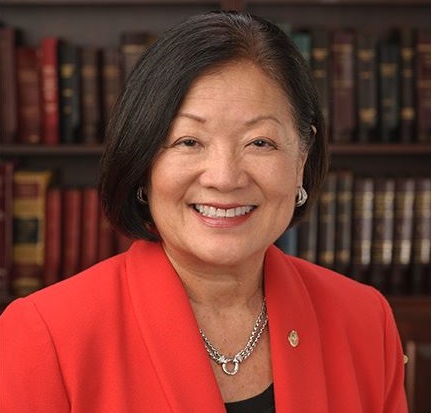October 01, 2019
WASHINGTON, D.C. – Senator Mazie K. Hirono (D-Hawaii) last week reintroduced her legislative plan to improve opportunities for women and minorities in science, technology, engineering and mathematics (STEM) fields.
"Women and minorities in STEM fields face obstacles at every step of their careers," said Senator Hirono. "The STEM Opportunities Act and Women and Minorities in STEM Booster Act will break down barriers and promote opportunities to engage our entire talent pool. As the demand for STEM workers grows in Hawaii and across the country, we must ensure that pathways to these jobs are inclusive of all Americans.”
Senator Hirono’s plan consists of two important bills:
STEM Opportunities Act: Introduced in the House of Representatives by House Science, Space, and Technology Committee Chairwoman Eddie Bernice Johnson (D-Texas), the STEM Opportunities Act requires increased data collection to better understand who receives federal grants, clarifies guidance for grant reviewers to minimize the effects of implicit bias, and establishes federal grants to promote research-based recruitment and retention practices for minority faculty and students at institutions of higher education. Additionally, the bill requires guidance for federal laboratories and institutions of higher education to identify any cultural or institutional barriers that limit the recruitment and retention of women and minorities in research careers.
“I am happy to see Senator Hirono leading a companion to the STEM Opportunities Act, which was considered on the House floor last week. The goal of our legislation is to develop and implement evidence-based policies to promote the progress of women, minorities, and other groups underrepresented in STEM studies and research careers,” said Chairwoman Johnson. “The need for full engagement in STEM by women and underrepresented groups goes beyond enabling individuals to fulfill their dreams of becoming a scientist. Our economic future relies on what we do now to nurture the STEM talent that will be necessary to meet the demands of an increasingly technological and knowledge-based economy.”
The legislation builds on progress made through the American Innovation and Competitiveness Act (AICA), which President Obama signed into law in early 2017 with several provisions that were championed by Senator Hirono.
The STEM Opportunities Act was cosponsored by Senators Richard Blumenthal (D-Conn.), Maria Cantwell (D-Wash.), Catherine Cortez Masto (D-Nev.), Tammy Duckworth (D-Ill.), Kirsten Gillibrand (D-N.Y.), Amy Klobuchar (D-Minn.), Ed Markey (D-Mass.), Jeff Merkley (D-Ore.), and Jacky Rosen (D-Nev.) in the Senate.
Following Senate introduction last week, the bill passed the House by voice vote.
Women and Minorities in STEM Booster Act: Introduced in the House of Representatives by Congresswoman Carolyn Maloney (D-N.Y.), the Women and Minorities in STEM Booster Act establishes grants to support programs designed to increase participation for women and minorities in STEM.
Under the bill, these programs would include online workshops, mentoring programs to connect professionals with students, internship programs for undergraduate and graduate students, outreach programs for K-12 students, retention programs for STEM faculty, and other related programs.
“Women today make up half of the current workforce, yet they still hold less than a quarter of all STEM jobs. Many groups including African-American, Hispanic, and Asian populations, make up only a quarter of the STEM workforce. It is all too clear that women and minorities are being left behind. That needs to change,” said Congresswoman Carolyn Maloney. “This bill will help bring more women and minorities into STEM education and help diversify our country’s potential in the manufacturing sector, a vital industry that will allow for America to remain competitive in the global economy.”
The Women and Minorities in STEM Booster Act was cosponsored by Senators Sherrod Brown (D-Ohio), Tammy Duckworth (D-Ill.), Dick Durbin (D-Ill.), Kirsten Gillibrand (D-N.Y.), Amy Klobuchar (D-Minn.), and Jacky Rosen (D-Nev.) in the Senate.
Senator Hirono has been a longstanding advocate for federal programs that improve opportunities for women and minorities in STEM. Last Congress, she introduced a similar legislative plan, and, earlier this year, she led a letter with 11 of her colleagues calling on the National Science Foundation (NSF) to continue its efforts to strengthen the STEM pipeline by maintaining funding for its programs that broaden participation for underrepresented groups.
In 2016, the Senator also convened a Senate Small Business and Entrepreneurship Committee field hearing at Maui High School to hear from national experts, including NSF, and local stakeholders regarding the importance of promoting more women and minorities in the STEM workforce.
Local groups have expressed support for both bills.
"Locally in Hawaii high-paying STEM jobs are spurring growth and boosting our island economy. MEDB’s Women in Technology and STEMworks™ initiatives continue to engage girls and women who are underrepresented in technology fields so that we can grow the STEM workforce pipeline and keep up with demand through hands-on STEM curriculum, training, mentoring and internship programs that have had a significant impact statewide,” said Leslie Wilkins, President & CEO, of the Maui Economic Development Board (MEDB) and Founding Director of the Women in Technology Project. “However, these programs still need support. Mahalo to Senator Hirono for introducing the STEM Opportunities Act and the Women and Minorities in STEM Booster Act to strengthen our efforts and create more opportunities for young women and minorities pursuing STEM careers and professions across the country.”
Numerous national groups have ?also endorsed the STEM Opportunities Act including the American Council on Education, American Society for Engineering Education, American Society for Microbiology, Computing Research Association, IEEE-USA, Society of Women Engineers, American Physiological Society, and American Association for the Advancement of Science.
###
